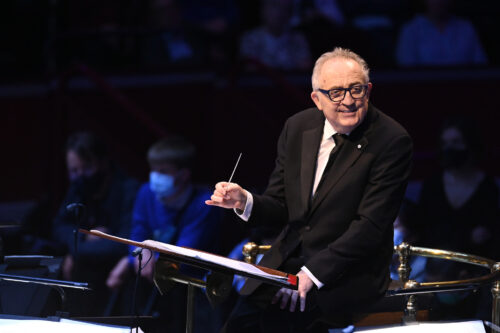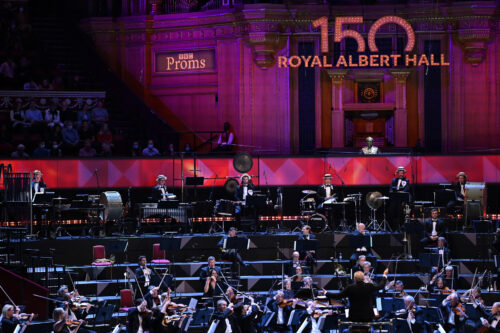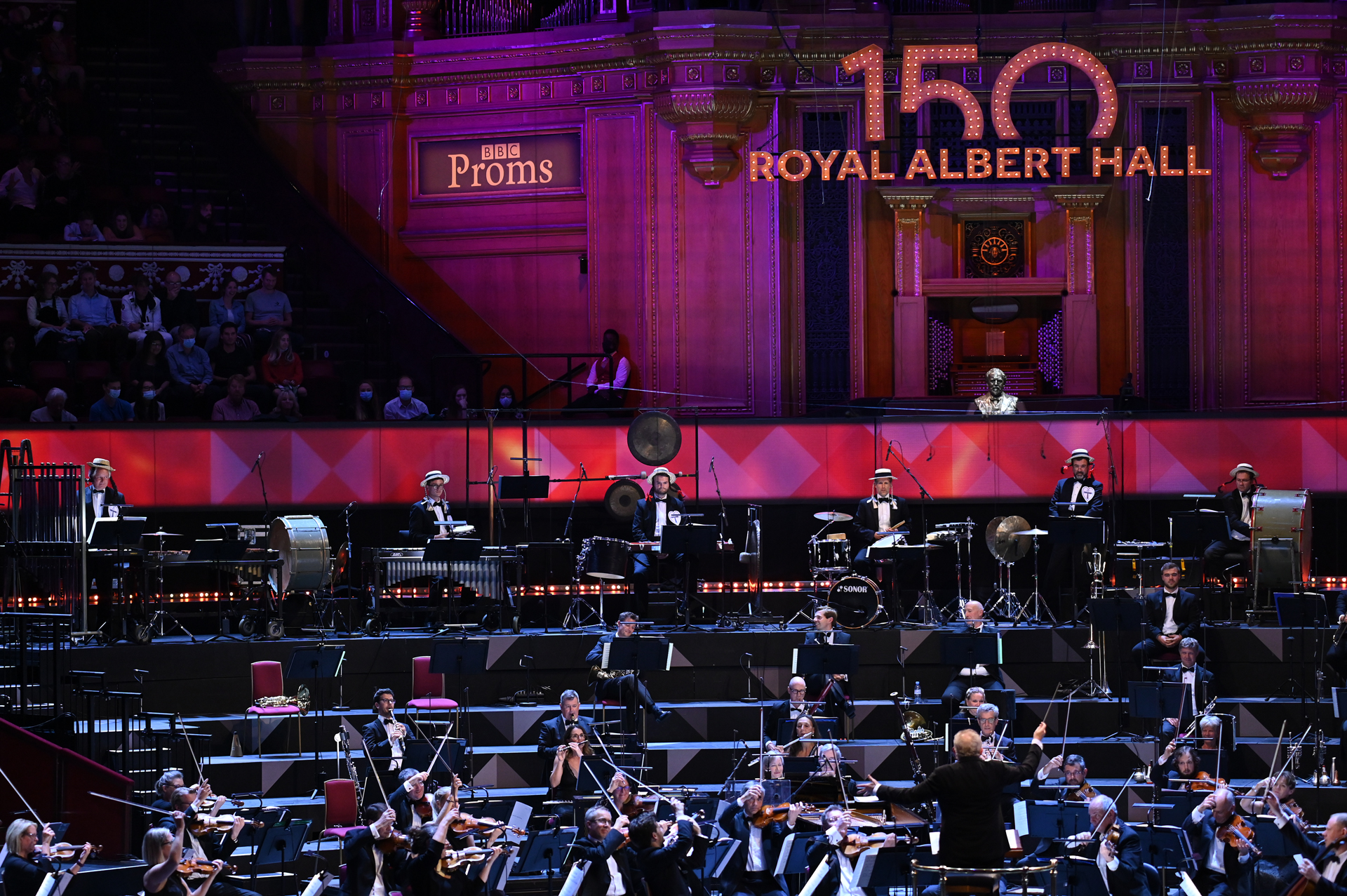
 United Kingdom BBC Proms 2021 [20] – 20th-Century British Film Music: BBC Concert Orchestra / Bramwell Tovey (conductor). Royal Albert Hall, London, 2.9.2021. (JB)
United Kingdom BBC Proms 2021 [20] – 20th-Century British Film Music: BBC Concert Orchestra / Bramwell Tovey (conductor). Royal Albert Hall, London, 2.9.2021. (JB)

Doreen Carwithen (arr. Philip Lane) – The Men of Sherwood Forest, Overture
Arnold (arr. Christopher Palmer) – Hobson’s Choice, Concert Suite
Alan Rawsthorne – The Cruel Sea, Main titles and Nocturne
Walton – Escape Me Never, Suite
Elizabeth Lutyens – The Skull, excerpts
William Alwyn – Old Man Out Suite, excerpts
Vaughan Williams (adapt. Muir Mathieson, Philip Lane) – Three Portraits from The England of Elizabeth
Arnold (arr. Christopher Palmer) – The Belles of St Trinian’s, Comedy Suite
First, an admission of my ignorance: I had never heard of Doreen Carwithen before I thought I might like to review this concert. Then I found that no less a person than Len Mullenger, Founder and Owner of Music Web International (from which Seen and Heard arose as the site which reviews mainly live music as opposed to recorded). Len was always known for his interest (passion might be a better word) for lesser-known British composers of the early twentieth century. And when Doreen Carwithen died in 2003, he wrote a fairly detailed obituary in The Independent. Len uses the word feisty of her efforts to find a place in the composer’s world.
She was an early voice in the feminist movement. At film recording sessions in the early 1900s it was usual for composers to be present, so the film director could ask for a rewrite (usually a shortening) of the score offered. Established composers often employed a junior to do this menial work. The pay to these juniors was abysmal and they were almost never credited for their work. Especially if they were a woman!
One day – or so the story goes – Malcolm Arnold was about to check out from a session and sighed aloud to Doreen (she hated the name but was eventually persuaded to hold onto it) that £90 was a pittance for a day’s work. She told him she was paid £70. She would ask immediately for an increase. She didn’t get it. Not immediately, anyway.
She studied with, had an affair with, then married William Alwyn. In that order. Both Malcolm Arnold and William Walton declared Doreen a better composer than Alwyn, whom she outlived by some years.
The film of Men of Sherwood Forest was typical of 1950s trash. But the music of Carwithen was not. The BBC programme quotes a review of the period: This low-budget swashbuckler is good for the undiscriminating. And Doreen had earned her £70 in providing a pastiche of adventure music which publicises such trash. Absurdity gleefully multiplied?
The same year (1954) Arnold showed his natural skill for writing comic music: a Sullivan who never really found his Gilbert. This was David Lean’s Hobson’s Choice with Charles Laughton, who could turn his abundant acting skills to whatever area would work best. Here he is the tyrannical patriarch of a Salford shoe shop. Christopher Palmer’s choices of pieces of the Arnold score show how even without the visuals, the music can convey the comedy.
The concert version is divided into four sections: (1) Overture and Shoe Ballet (different kinds of shoes) (2) Willie and Maggie (Hobson’s two daughters) – a theme and variations (3) Wedding Night (Theme and Variations II) (4) Finale -the whole mash-up.
Alan Rawsthorne (1905-71) could never hope to arrive at Arnold’s fresh wit. Sorry BBC, but this is scraping the barrel to find humour, which is simply not there, however hard you try. The Cruel Sea (1953) is less funny than slipping on banana peel. Rawsthorne’s contribution is not even comic by default.
There is a fascinating correspondence between William Walton and Malcolm Arnold – two friends who couldn’t have been more different. While Arnold had an outstanding technique for knowing what to do with a comic tune, once you had invented it, Walton had no technique whatsoever. Those witty tunes of Façade, for instance, took him an eternity to write. They sound as though they wrote themselves. But Sir William would not – could not – write another comic work. His friend, Hans Henze, tried to show him what a technique was. But William had no idea what Hans was talking about. The Walton masterpieces are many. But they are not comic. He grew weary of trying as he aged. I get up in the morning and start to write. But I look at the manuscript paper and it remains blanc. Then I pour myself a whisky and it’s time for lunch, he once wistfully told me.
The Escape Me Never Suite (1935) paints works as a piece of music. And because it is not even an attempt at comic music. William would have shuddered at the thought. The lush Prelude and Venetian Idyll give us what Walton does best: rolling romanticism of an earlier school. He always blushed as knowing that he belonged to this school. Like the second movement paints a musical escapade of the Dolomites. And the third is a ballet, which does have a whiff of humour, if restrained.
There was an interval of twenty-five minutes. The best piece of all said the two very nice girls who were sitting next to me – they even volunteered to fetch me a drink from the bar! And said they were students at the RCM of one of the percussionists. Those gentlemen did indeed acquit themselves very well. More in a minute.
Lady Walton found Malcolm Arnold drying out in a rehabilitation clinic. But the Maestro agreed that the Walton Foundation archive in Ischia would be the right place for the correspondence to be. So, there it is.
Alcoholics are almost never drunk. The problem is another one. Elizabeth Lutyens would frequently be found propping up the bar at Le Petit Club Français in St James’s Place, founded and run by Olwen Vaughan, who herself had the battle with the bottle. Olwen started her club for the French resistance during the War. Both Olwen and Elizabeth were excellent company. Elizabeth delved into Arnold Schoenberg’s twelve-tone system to suggest the horrors in the film The Skull (1965) where occultist Dr Christopher Maitland (Peter Cushing) examines the skull of the Marquis de Sade. This is clever. And it works as unadorned comedy. I can hear Olwen and Elizabeth laughing at their own joke. Francis Bacon was another member who donated paintings when Olwen held a bring and buy sale. Which was often. Rudolf Nureyev, another member, would drink enough champagne to drown a battleship. He was athletic, of course, and never appeared to be drunk. Times were jolly even when they were black at the French Club. For tonight we’ll merry, merry, be and all that.
William Alwyn’s Odd Man Out Suite (1947) was written for Carol Reed’s film of the same name. For comedy it is as dull as ditch-water. The movie is mildly entertaining so long as you don’t think of it as comedy.
Ralph Vaughan Williams’s Three Portraits from ‘The England of Elizabeth’ works as comedy largely through Muir Mathieson’s rescuing of it. Vaughan Williams was responding to a 1950s government request to cheer up the nation – once again finding itself in the doldrums. A government sponsored scheme was inviting composers to submit some cheer-up music and conductor Muir Mathieson, who should have conducted the original but was unwell at the time, seized the opportunity to revive the Three Portraits with some emphasis on their fun (never a particular Vaughan Williams strength). The three movements are (1) Explorer – Sir Francis Drake (2) Poet – Shakespeare and (3) Queen – Elizabeth II. Finally, the orchestra’s back row of six percussionists are called into their own. And how they deliver! The high- and low-pitched wooden blocks are given rhythms to play with, the three pitches of gongs come into their own. We are back to the spirit of the Music Halls here.
Shakespeare gets some wistful-sounding quotes: When that I was and a little tiny boy (Twelfth Night) and other morsels get a look in. Enchantment more than comedy, maybe. There is some rattling away on the xylophone too. Phrases of Walton’s romanticism are brought out unashamedly.

The biggest prize of the evening must go to Christopher Palmer’s arrangements of Malcolm Arnold’s witticisms from one of the best of the St Trinian’s films – The Belles. (A movie available on BBC iPlayer for a few weeks.) There is the pleasure of Alistair Sim in drag as Headmistress Miss Fritton, George Cole’s spiv Flash Harry, and Joyce Grenfell’s policewoman in disguise as the sports mistress: three extraordinary comedy crowns gathered together. The audience were invited to join in the school’s song with clapping and singing à la Last Night of the Proms: ‘Let our motto be broadcast: get your blow in first! She who draws the sword last always comes off worst’. The row of percussionists donned straw hats for this finale and threw screwed up bits of paper at one another.
It remains to be said that Bramwell Tovey’s conducting of the BBC Concert Orchestra was exemplary throughout this challenging, musical jigsaw puzzle.
For the encore there was the whistling and roaring of Colonel Bogey which Malcolm Arnold incorporated into his music for Bridge Over the River Kwai (1957). He always insisted that the Oscar statuette (for Best Original Score) he got meant nothing to him and gave it to his daughter who used it as a door stopper.
Jack Buckley

Why on earth do you think the whole programme was meant to be ‘comic’? Or are you being ironic? Rawsthorne’s Cruel Sea music adds greatly to that powerful movie. The only comedy in the evening was St. Trinian’s, and I suppose moments in Hobson. Otherwise the music was underscoring the emotions of the very different – not comic – films it was written for! Very strange review. [edited]
Sometime in the 1960s I was in Piazza Navona, Rome, following a rehearsal at RAI with William Walton and André Previn of Belshazzar’s Feast. LSO Chorus were with the RAI Orchestra. (William had asked me to put together this for his eightieth birthday celebrations.) I was, for a time, the British Council’s Arts Officer. André Previn asked William who was the world’s greatest composer. Without hesitation William replied ‘Rossini’. After William left, André said ‘You’re a Lancastrian like William; is this some brand of Lancastrian humour?’. I said certainly not. I had had the ‘Greatest Composer’ debate many times on my many visits to Ischia with William. His answer was no surprise to me. It would have also been my answer if anyone had asked me, independent of William’s views. (William also shoved a box of Sibelius symphonies into my hands, saying he bet that I didn’t know them. He was right. I remain grateful to him for my Sibelius education).
I touch on the questions as to why Rossini was in first place in our estimation. It was not just a colossal gift for melodic invention and instantly knowing what to do with that material. The Arnold/Walton correspondence is fascinating on this subject. The two friends could not have been more different. Elizabeth Lutyens is an unlikely scorer for humour in music but (surprisingly) she shows us how it is done. I was perhaps overly severe in my verdict on the non-humorists. Humour is always the hardest art to being off whether you’re a singer, actor, poet or writer. I hope you can see why I was bored blue during the Alwyn piece. I’d made the wrong assumption that the BBC was out to entertain through humour (with this lighter music), dear Martin.